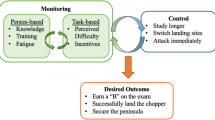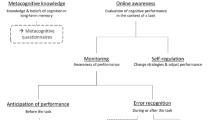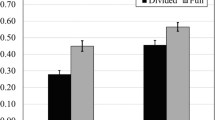Abstract
Metacognitive monitoring is a central element of metacognitive processing exerting widespread influences on information processing. Albeit being subject to numerous empirical investigations referring to memory performance, there is little research investigating metacognitive monitoring in other cognitive domains. The present study investigated in 45 healthy students whether factors that are known to influence monitoring of memory performance, i.e. task difficulty, time of assessment, and practice, also exhibit a significant impact on monitoring of attention performance. A multivariate analysis of variance with three within-subject repeated measures factors on two dependent variables (monitoring of (a) time, and (b) errors in an attention task) was conducted. Results showed that monitoring ability significantly decreased with increasing task difficulty, was significantly better for post than for pre-assessment, and significantly increased with practice. Therefore, results suggest that the examined factors influenced monitoring of attention performance equivalent to the influence of these factors found in metamemory research.



Similar content being viewed by others
Notes
Note that we included the most stringent correlation parameter of zero. Rerunning the power analysis with an expected intercorrelation >0 results in a smaller estimated sample size while simultaneously achieving the same power.
References
Bäumler, G. (1985). Farbe-Wort-Interferenztest (FWIT) nach J. R. Stroop. Göttingen: Hogrefe.
Cohen, J. (1988). Statistical power analysis for the behavioural sciences (2nd ed.). Hillsdale: Lawrence Earlbaum Associates.
Dunlap, W. P., Cortina, J. M., Vaslow, J. B., & Burke, M. J. (1996). Meta-analysis of experiments with matched groups or repeated measures designs. Psychological Methods, 1(2), 170–177.
Dunlosky, J., & Hertzog, C. (2000). Updating knowledge about strategy effectiveness: a componential analysis of learning about strategy effectiveness from task experience. Psychology and Aging, 15(3), 462–474.
Durlak, J. A. (2009). How to select, calculate, and interpret effect sizes. Journal of Pediatric Psychology, 34(9), 917–928.
Edwards, J. R. (1994). The study of congruence in organizational behavior research: critique and a proposed alternative. Organizational Behavior and Human Decision Processes, 58(1), 51–100.
Faul, F., Erdfelder, E., Lang, A.-G., & Buchner, A. (2007). G*Power 3: a flexible statistical power analysis program for the social, behavioral, and biomedical sciences. Behavior Research Methods, 39(2), 175–191.
Fernandez-Duque, D., & Black, S. E. (2007). Metacognitive judgment and denial of deficit: evidence from frontotemporal dementia. Judgment and Decision Making, 2(5), 359–370.
Flavell, J. H. (1979). Metacognition and cognitive monitoring: a new area of cognitive-developmental inquiry. American Psychologist, 34(10), 906–911.
Glenberg, A. M., Sanocki, T., Epstein, W., & Morris, C. (1987). Enhancing calibration of comprehension. Journal of Eperimental Psychology: General, 116(2), 119–136.
Hedges, L. V., & Olkin, I. (1985). Statistical methods for meta-analysis. Orlando: Academic Press.
Holmbeck, G. N., Li, S. T., Schurman, J. V., Friedman, D., & Coakley, R. M. (2002). Collecting and managing multisource and multimethod data in studies of pediatric populations. Journal of Pediatric Psychology, 27(1), 5–18.
Irving, P. G., & Meyer, J. P. (1999). On using residual difference scores in the measurement of congruence: the case of met expectations research. Personnel Psychology, 52(1), 85–95.
Kelemen, W. L., Frost, P. J., & Weaver, C. A. (2000). Individual differences in metacognition: evidence against a general metacognitive ability. Memory & Cognition, 28(1), 92–107.
Koriat, A. (1997). Monitoring one’s own knowledge during study: a cue-utilization approach to judgments of learning. Journal of Experimental Psychology: General, 126(4), 349–370.
Koriat, A. (2007). Metacognition and consciousness. In P. D. Zelazo, M. Moscovitch, & E. Thompson (Eds.), The Cambridge handbook of consciousness (pp. 289–325). New York: Cambridge University Press.
Koriat, A., & Shitzer-Reichert, R. (2002). Metacognitive judgments and their accuracy. In P. Chambres, M. Izaute, & P.-J. Marescaux (Eds.), Metacognition process, function and use (pp. 1–17). Norwell: Kluwer Academic Publishers.
Maki, R. H., Jonas, D., & Kallod, M. (1994). The relationship between comprehension and metacomprehension ability. Psychonomic Bulletin & Review, 1(1), 126–129.
Marshall, M. J., & Wilsoncroft, W. E. (1989). Time perception and the Stroop task. Perceptual and Motor Skills, 69, 1159–1162.
Mengelkamp, C., & Bannert, M. (2009). Judgements about knowledge, searching for factors that influence their validity. Electronic Journal of Research in Educational Psychology, 7(17), 163–190.
Nelson, T. O., & Narens, L. (1990). Metamemory: a theoretical framework and new findings. In G. Bower (Ed.), The psychology of learning and motivation (pp. 125–173). New York: Academic Press.
Perfect, T. J. (2002). When does eyewitness confidence predict performance? In T. J. Perfect & B. Schwartz (Eds.), Applied metacognition (pp. 95–120). Cambridge: Cambridge University Press.
Roderer, T., & Roebers, C. M. (2010). Explicit and implicit confidence judgments and developmental differences in metamemory: an eye-tracking approach. Metacognition and Learning, 5, 229–250.
Schraw, G. (1997). The effect of generalized metacognitive knowledge on test performance and confidence judgments. The Journal of Experimental Education, 65(2), 135–146.
Schraw, G. (2009). Measuring metacognitive judgments. In D. J. Hacker, J. Dunlosky, & A. C. Graesser (Eds.), Handbook of metacognition in education (pp. 415–429). New York: Routledge.
Schraw, G., Dunkle, M. E., Bendixen, L. D., & Roedel, T. D. (1995). Does a general monitoring skill exist? Journal of Educational Psychology, 87(3), 433–444.
Schraw, G., & Moshman, D. (1995). Metacognitive theories. Educational Psychology Review, 7(4), 351–371.
Schraw, G., & Roedel, T. D. (1994). Test difficulty and judgment bias. Memory & Cognition, 22(1), 63–69.
Shaughnesssy, J. J., & Zechmeister, E. B. (1992). Memory monitoring accuracy as influenced by the distribution of retrieval practice. Bulletin of the Psychonomic Society, 30(2), 125–128.
Wells, A. (2000). Emotional disorders and metacognition: innovative cognitive therapy. Chichester: Wiley.
Yeung, N., & Summerfield, C. (2012). Metacognition in human decision-making: confidence and error monitoring. Philosophical Transactions of the Royal Society B: Biological Sciences, 367(1594), 1310–1321.
Author information
Authors and Affiliations
Corresponding author
Rights and permissions
About this article
Cite this article
Kessel, R., Gecht, J., Forkmann, T. et al. Metacognitive monitoring of attention performance and its influencing factors. Psychological Research 78, 597–607 (2014). https://doi.org/10.1007/s00426-013-0511-y
Received:
Accepted:
Published:
Issue Date:
DOI: https://doi.org/10.1007/s00426-013-0511-y




